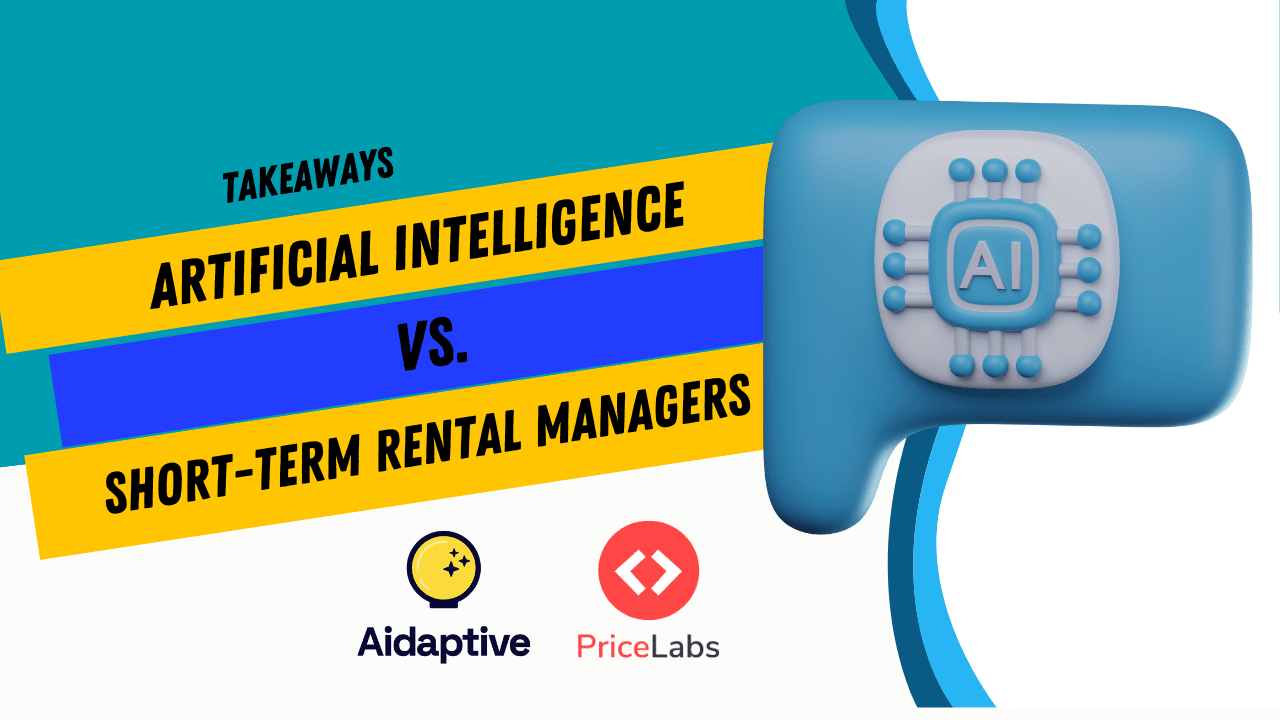The mere mention of A.I. can sometimes invoke wariness and even fear among short-term rental hosts and managers who worry about losing control to machines. While it’s true that A.I. is transforming the industry in profound ways, it’s important to understand that these tools are designed to enhance and augment human capabilities rather than replace them.
On February 28, 2023, we organized a free online conference, bringing together experts in the field of A.I., Machine Learning (ML), and algorithm-powered tools to explore how short-term rental managers can harness the power of A.I. to manage their businesses with greater efficiency and drive more bookings and customer loyalty.
We take a look at how large Online Travel Agents (OTA) such as Airbnb and Booking.com use these computer-powered content, pricing, and personalization technologies for your listings, and you can now leverage A.I. tools at your disposal to increase your revenues, create more content, and boost direct bookings.
Rental Scale-Up Founder and PriceLabs Head of Product Marketing Thibault Masson hosted the event alongside speakers:
– Anurag Verma, Co-Founder, PriceLabs
– Braeden Flaherty, Hospitality Program Manager, Aidaptive
– Evan Dolgow, Head of Predictive Hospitality, Aidaptive
What are some concrete examples of A.I., algorithms, and Machine Learning used by Airbnb and Booking.com?
Technologies such as A.I. and Machine Learning already play a significant role in the short-term rental landscape, and their use is much more widespread than you might think.
Airbnb rewrites the titles of thousands of listings. And categorizes these listings.
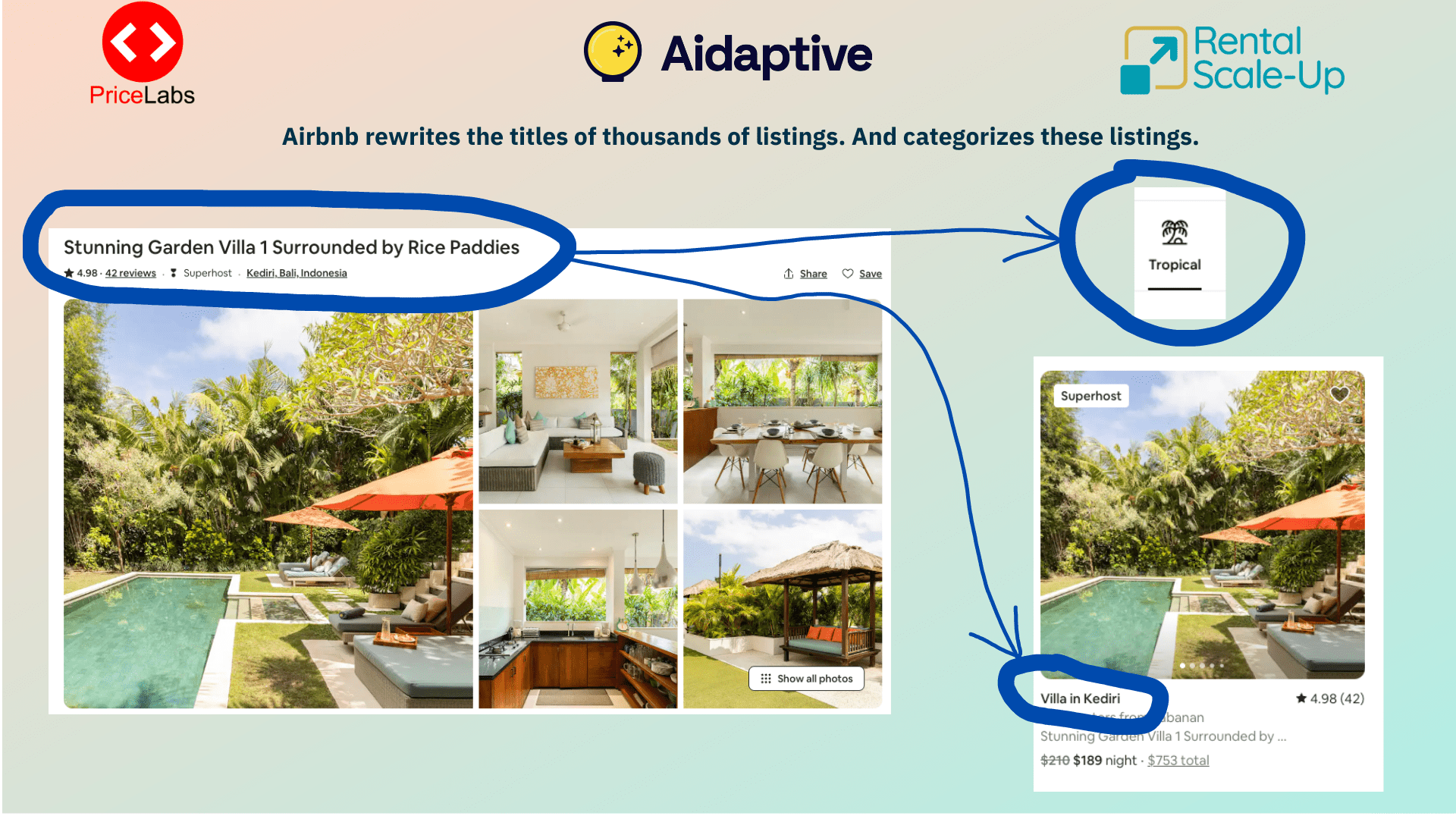
Airbnb is no stranger to using artificial intelligence (A.I.) to improve its platform. One of the ways it does this is by automatically rewriting and categorizing thousands of listing titles using machine learning algorithms, as shown in the example below. By analyzing patterns in language usage, A.I. can identify keywords that are most likely to attract potential guests, resulting in more bookings for hosts.
Additionally, A.I. can categorize listings based on their attributes such as location, amenities and accommodation type, making it easier for guests to find what they’re looking for quickly and easily.
Aidaptive’s Evan Dolgow is quick to point out that image classification is at play, too, meaning that Airbnb’s algorithm identifies the unique identifiers in your photos, e.g. the pool, the umbrella, and the trees in the background to inform their categorization.
Airbnb also connects the dots between guest preferences and what the algorithm can ‘see’ about your listings to deliver recommendations that are increasingly customized.
Booking.com auto-generates hundreds of new listing descriptions
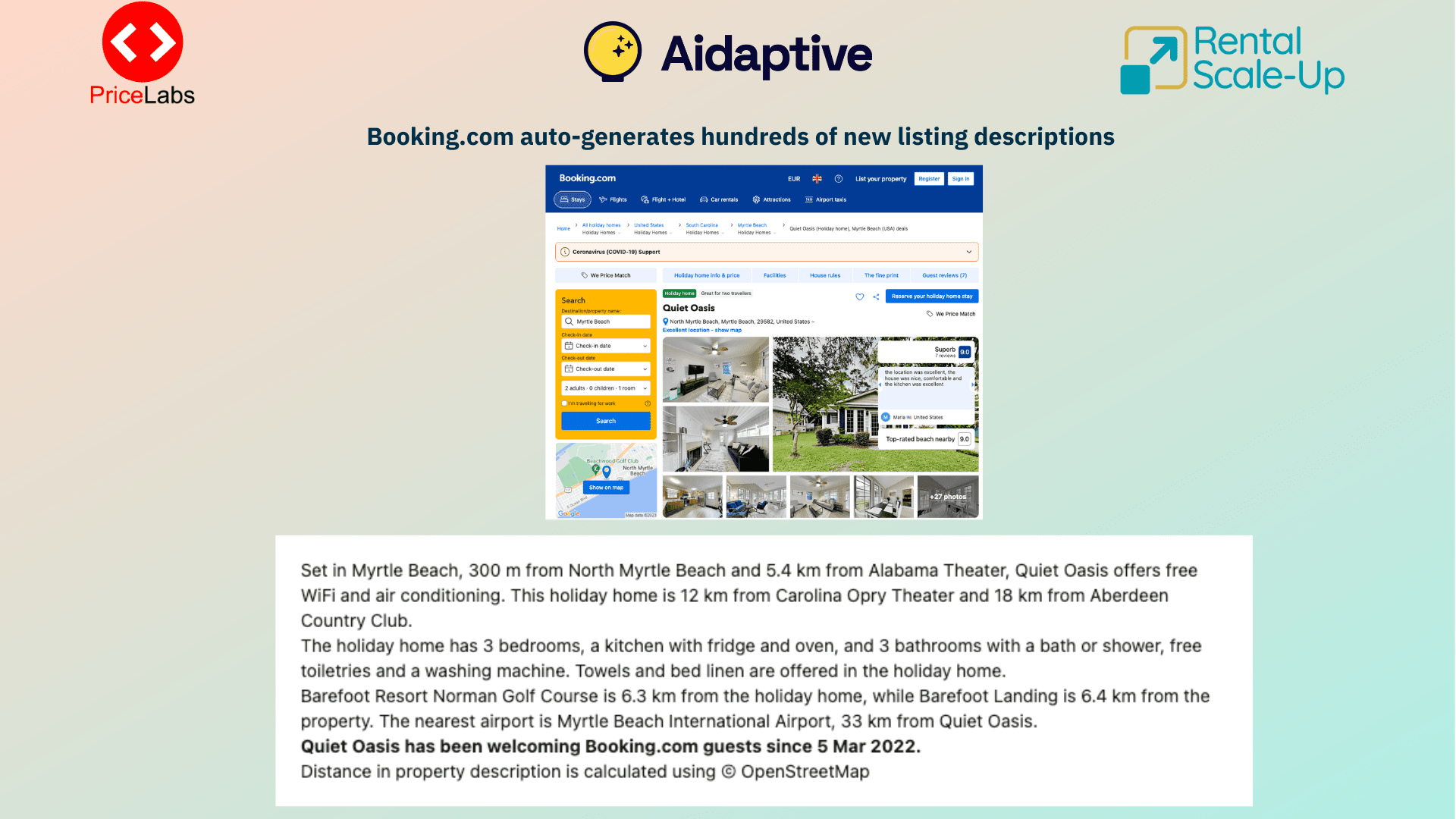
Booking.com is taking advantage of the power of artificial intelligence (A.I.) and machine learning to make it easier for hosts to create listings on its platform. In fact, If you list on the platform, you may have noticed that hosts aren’t even required to provide a listing description when creating a new listing.
That’s because A.I. algorithms can automatically generate hundreds of unique and optimized descriptions based on information provided by the host, such as photos and amenities. By analyzing patterns in language usage and user behavior, these algorithms can craft compelling descriptions that highlight the most important features of each property while also catering to the preferences of potential guests.
This technology not only saves hosts’ time but also improves the overall quality of listings on Booking.com by ensuring they are consistent in terms of content and style. Additionally, A.I.-generated descriptions can help increase visibility and bookings for hosts who may struggle with crafting effective descriptions themselves.
In the example above, we see that the auto-generated description emphasizes the location heavily, presumably because guest behavior so far has shown that location matters to them when it comes to a stay at Myrtle Beach.
Conversely, this can be frustrating for managers to not be able to control the messaging around their properties. “A good way to circumvent this is to use the Hotelier field of your listing to insert your own description,” Aidaptive’s Braeden Flaherty offers helpfully.
Airbnb varies rates automatically for millions of properties
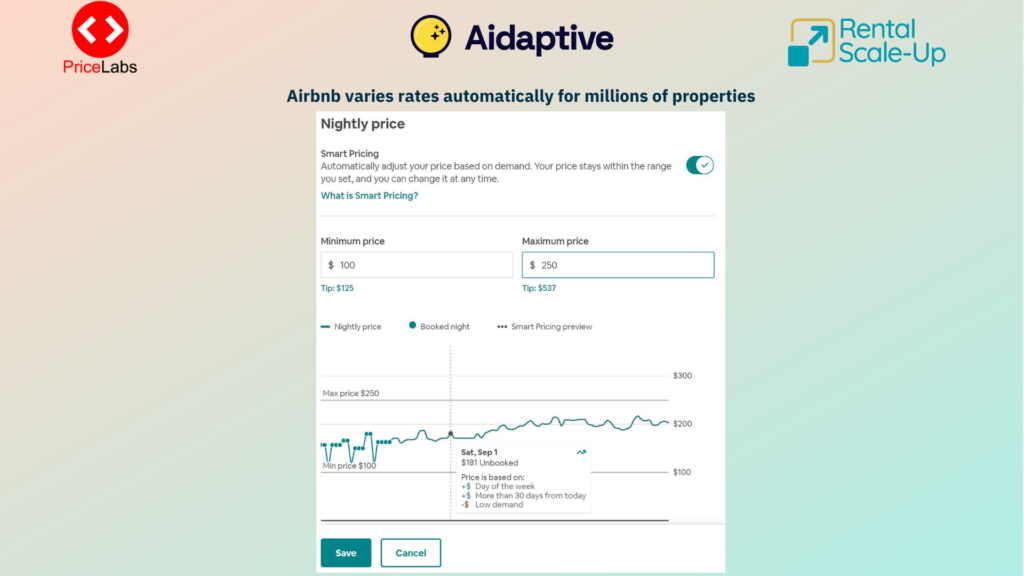
When you create a listing on Airbnb, the platform turns on its Smart Pricing feature by default. This is where artificial intelligence (A.I.) comes into play, as it allows Airbnb to automatically adjust rates for millions of properties based on factors such as demand, seasonality, and local events. Smart Pricing uses machine learning algorithms to analyze data from past bookings and market trends in real time, ensuring that hosts are always offering competitive rates while maximizing their earning potential.
The idea is to ensure hosts can save time and effort by not having to manually adjust their prices constantly, while also potentially increasing their revenue through dynamic pricing strategies.
PriceLabs’ Co-Founder Anurag Verma reminds hosts and managers that unlike marketplaces such as Amazon, where sellers can offer multiple identical products, in the case of short-term rental bookings, hosts can only sell one night once. It’s crucial for hosts and managers to optimize their pricing across all online travel agencies (OTAs) where their properties are listed, including platforms like Vrbo or Booking.com. This is because Airbnb only fluctuates pricing based on demand and supply within its own platform.
To ensure they remain competitive and maximize profitability, short-term rental businesses should consider utilizing tools like PriceLabs to effectively optimize prices across all channels. By doing so, they can increase occupancy rates and revenue while offering fair and reasonable prices to guests.
Airbnb, Vrbo, and Booking use algorithms to rank your listings to boost their conversion rates and profit
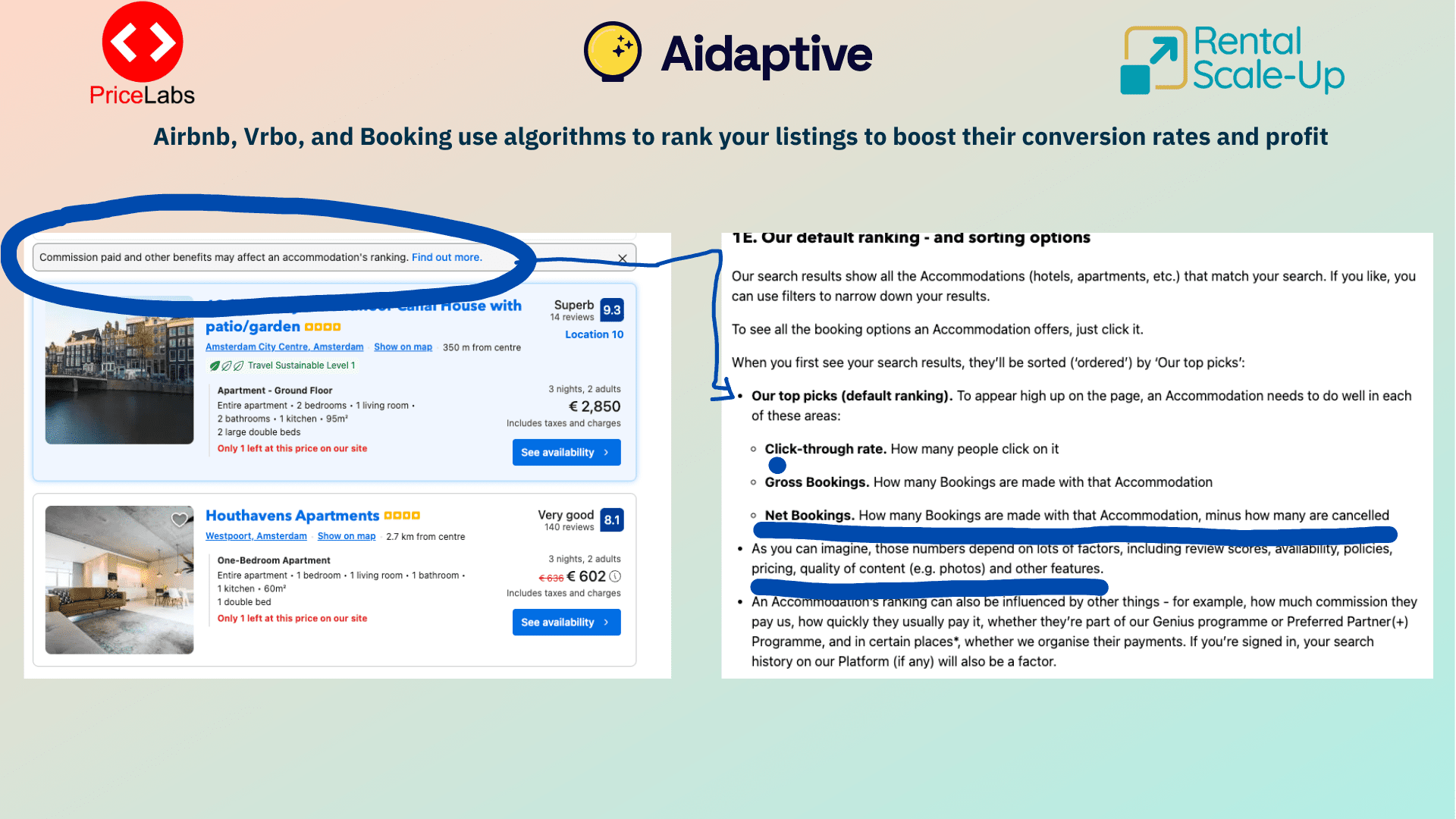
Airbnb, Vrbo, and Booking.com all use algorithms to rank listings in search results. These algorithms are designed to boost the conversion rates of these platforms and increase their profits.
The exact factors that influence a listing’s ranking can vary from platform to platform, but generally include things like price competitiveness, availability, and guest reviews. Hosts who consistently receive positive reviews and maintain high occupancy rates are more likely to be rewarded with higher rankings on these platforms.
In the example above we showcase Booking.com’s disclaimer on its European portals, which goes a long way toward explaining what influences search result rankings.
It shows that while factors such as review scores, flexible policies, and pricing are important, but parameters like Clickthrough Rates, Gross Bookings, and Net Bookings play a huge role in how your listing ranks, too.
Booking.com makes 15-17% commission on bookings, so it makes sense that it upranks listings that get the most bookings, even hedging its bets further by promoting listings with fewer cancellations by making Net Bookings a factor.
However, it’s important to note that these algorithms can change over time, so hosts must stay up-to-date with the latest best practices for each platform and adjust their strategies accordingly to remain competitive.
Additionally, Evan Dolgow, points out, that as a guest navigates the platform, Booking.com would personalize their journey beyond the default parameters, based on user behavior.
How can vacation rental managers leverage ChatGPT today in their daily tasks?
Vacation rental managers can leverage ChatGPT today to optimize their daily tasks and improve their overall efficiency. For example, hosts and managers can use it to:
- Create content that is interesting to readers and good for SEO
- Reply to a review
- Reply negatively to a booking inquiry (asking about something your property does not offer)
- Enhance listings descriptions by letting ChatGPT rephrase them in a more inspirational tone and with context extracted from real customer reviews.
- Add best practices to your employee manual (e.g. How to reply to bad reviews professionally)
During the conference, your host and Rental Scale-Up Founder Thibault Masson demonstrated live how short-term rental managers can use ChatGPT for each of the above-mentioned tasks, as previously published in detail on our website.
What are the broad categories of A.I.? What are examples of those within the short-term rental industry?
Artificial Intelligence, commonly known as A.I., is a broad term that encompasses a wide range of technologies. In the hospitality industry, various examples of A.I. tech are currently being used to enhance guest experiences and streamline operations. Here are some examples of how these technologies are being utilized:
- Rules-based algorithms are a type of artificial intelligence that uses a set of pre-defined rules to make decisions based on certain inputs or conditions. Airbnb uses these algorithms to categorize listings into different categories and subcategories based on factors such as location, property type, amenities, and other criteria.
The platform uses this information to ensure that listings are properly classified and can be easily found by guests searching for specific types of properties. Essentially, rules-based algorithms help automate the process of categorizing listings and ensure consistency across the platform.
- NLP stands for Natural Language Processing, which is a branch of artificial intelligence that focuses on enabling computers to understand and interpret human language. ChatGPT is an AI writing assistant that uses NLP to generate text based on user input. Specifically, it uses deep learning algorithms to analyze the context and meaning of words and phrases in order to produce coherent and relevant responses. This allows ChatGPT to understand the nuances of language and generate text that is similar in style and tone to human-written content.
It is worth noting that ChatGPT can create decent first drafts for content, but still requires human supervision.
- An extension of NLP use is sentiment analysis, which helps identify and extract subjective information from text, such as opinions, emotions, attitudes, and sentiments expressed by individuals or groups, and is therefore a critical component of automated review handling.
- Pricing algorithms are computer programs that use data and mathematical models to determine the optimal price for a product or service. These algorithms can take into account a variety of factors such as demand, competition, supply, and customer behavior to help hosts and managers maximize their profits.
Dynamic pricing tools are one application of pricing algorithms that adjust prices in real-time based on changing market conditions.
To do this, dynamic pricing tools like PriceLabs analyze large amounts of historical data and monitor future market trends. They then apply complex pricing algorithms to this data in order to determine the optimal price for stays at any given time. This allows short-term rental operators to stay competitive while maximizing their revenue and profit margins.
- Image classification in AI is the process of categorizing images into different classes or categories using machine learning algorithms. In short-term rentals, image classification can be used to automatically identify and tag various features of a rental property, such as the number of bedrooms, amenities like a pool or gym, kitchen appliances, etc., making it easier for guests to find properties that meet their specific needs and preferences.
It can also be a helpful tool to generate automatic captions for a large number of images.
Additionally, image classification can also help rental owners and managers quickly identify issues or maintenance needs within a property by analyzing images uploaded by guests or cleaning staff.
- Predictive AI uses machine learning algorithms to analyze data and make predictions about future events or behaviors, and serve recommendations based on guest affinities. In short-term rentals, it can be used to forecast demand for rental properties and identify potential issues before they occur.
For example, a predictive AI model could analyze historical booking data, seasonal trends, and local events to predict occupancy rates for a particular property and suggest pricing adjustments accordingly.
Additionally, predictive AI could also be used to detect anomalies in guest behavior or review patterns that may indicate fraudulent activity or other issues that need attention. Mainstream payment providers already have these systems in place to prevent payment fraud. Guest verification tools utilize predictive AI as well.
List of AI-Powered tools short-term rental hosts and managers can use today
Here is a list of A.I.-powered tools designed specifically with short-term rentals in mind, recommended by our panelists, that can help hosts and property managers streamline their operations today:
- Yada.AI: A guest messaging automation and conversational AI platform designed for hotels and rentals
- Laasie.AI: Recommends personalized perks associated with travel programs to encourage users to utilize their points
- Deepl Translate: An AI-powered translation service that uses neural networks to provide accurate and natural translations.
- Hospitable: Automate personalized human-sounding conversations and task notifications while synchronizing your calendar across multiple platforms.
- Autohost AI: A.I.-powered guest screening to stop parties, chargebacks, and property damage
- Paraspot: A remote property inspection platform enabling property management companies to perform rental inspections online with just their phone
- PriceLabs: Manage prices and availability easily with data-driven insights and automation rules
- Interior AI: Visualize and plan interior design changes to a room or space by providing suggestions based on user preferences and generating 3D models.
- Aidaptive: Predict the best products to promote to every person based on dozens of personalization factors, automatically.
- HostWizard: Guest messaging, screening, listing description generation all in one place
- Jasper: An advanced version of ChatGPT used to generate text and photo content
How can a property manager determine whether an AI-powered solution from a vendor is worth trying and if the technology is truly AI-powered?
As our panelist Evan Dolgow mentioned, not all AI is created equal, and sometimes vendors claiming to use AI technology may not even employ machine learning personnel.
By verifying the authenticity and effectiveness of the technology, property managers can ensure that they are making wise investments that will benefit their operations and bottom line. Additionally, they can avoid wasting time and resources on solutions that do not meet their needs or live up to their promises. Here’s what short-term rental operators must keep in mind before signing on:
- Research the vendor’s reputation and customer reviews
- Ask for a demo or trial period to evaluate if the technology meets their specific needs
- Ask for more information about the AI algorithms used to power the solution to verify its authenticity.
- Review the LinkedIn profiles of their team to check for developers with AI training on their staff
- Identify challenging aspects of your business and areas that are hard to staff and look for appropriate solutions
- A useful question to ask is if you can integrate your own data into the company’s product
“The most important aspect is whether a tool adds value to your business, not whether it incorporates AI,” reminds Braeden Flaherty.
What kinds of data should I collect now to optimize my future AI-powered performance?
To optimize future AI-powered performance, it is important to collect the right data. While humans are not designed for data analysis, machines excel at processing and deploying data.
Examples of valuable data include reservation information, messaging logs, onboarding materials that can be used to train language models, as well as historical pricing and occupancy data and reviews.
Pricing Data: From a revenue management and dynamic pricing perspective, your historic booking data is a valuable resource and can provide illuminating insights such as year-on-year demand (e.g. How was I doing this time last year)
At PriceLabs, all data is stored to aid in creating models. However, some customers may not have the tools to save their data from their PMS, so PriceLabs stores this data on their behalf.
Website Analytics: One of the easiest and most valuable sources of data is website analytics which can be automatically stored in Google Analytics. To maximize the potential insights gained from this data, it’s good practice to provide visitors with multiple options, such as featured properties and recommended properties, that they can click on to learn more based on their behavior. By offering these options, businesses can gain a better understanding of what guests are interested in and tailor their offerings accordingly. This can pave the way for direct booking websites to provide personalized recommendations and learn from user behavior.
To note:
AI technology is capable of handling messy data effectively, but it’s essential to prioritize privacy concerns and ensure that data can be saved, stored, and reused legally.
When switching software systems, it’s crucial to make sure that historical data is stored somewhere accessible so that it can be leveraged for future analysis. By collecting and storing relevant data now while prioritizing privacy concerns and ensuring legal compliance, businesses can optimize their future AI-powered performance.
The short-term rental industry is booming, but with increased competition and changing consumer demands, it can be challenging for managers to stay ahead. Fortunately, advancements in artificial intelligence (A.I.) are making it easier than ever before for managers to optimize their business operations and boost customer loyalty. By leveraging A.I. tools such as predictive analytics and chatbots, managers can streamline their workflow, automate routine tasks, and even personalize the guest experience.

